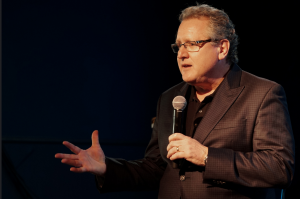
By Mark Schaefer
My friend Mitch Joel has been on a roll lately. I’ve always considered him one of the world’s great marketing bloggers but the quality of his thinking lately seems to have gone up a notch. If you don’t yet subscribe to his blog Six Pixels of Separation, you should!
One of his recent posts inspired today’s topic … and it’s a juicy one: How social media is upending traditional marketing strategy … perhaps business strategy.
Mitch and I have both written recently about the danger of politicizing a brand. But Mitch makes the additional smart point that brands may not have a choice in the matter — customers may be demanding that we take a political stand. This is a thought-provoking and controversial view we will begin to flesh out today.
I’ve often marveled at how slow the corporate world has adjusted to the realities of social media. It’s been a 10-year grieving process, really — denial, followed by anger, bargaining, depression and ultimately acceptance. Finally, most companies have the organizations in place to talk back to consumers, respond to problems, and even learn from them through social media.
Conforming to the needs of a social audience meant more than adding a few people to tweet for you. Social media has changed the DNA of the corporate culture, made it more connected, empathetic, transparent, and human. I started my career in corporate PR decades ago. The openness and honesty we see today was unimaginable back in the era of “controlling the message” and spinning the press around a topic. And that is a positive development.
What’s next in the PR evolution
But we are entering a new phase of this cultural development. Customers don’t merely want to know where their order is, or where thy can find a good deal. They want to know what we stand for. Mitch Joel writes about this beautifully in his recent post:
“Brands are willingly (and unwillingly) being pulled into these social media, traditional media and public battles, that are driven by a customer’s values and how they may oppose those of the brands. It’s interesting: the consumer now believes that it’s not about what you sell and the price of it, but what you stand for.
“What’s unique now, is that the brand response is no longer binary. In today’s environment, brands that have quickly/swiftly removed themselves from the situation have often not been applauded, but hurt more for bending and cowering to another side. Brands that have pointed the blame elsewhere (like, say, blame the technology) have been bashed for being so out of touch with how business works these days. Brands that have distanced themselves from influencers that have run amok, are still accused of using them for when it works for the brand, but bailing on them when times get tough (meaning: not authentic). And more.
“With the current climate, it’s hard to figure out what the course of action should be. What are we really seeing? It feels like a world where consumers want brands to be more personal. They wants brands to be open and to stand for something, but when something goes awry (and it always does), the pitchforks are out. Consumers seem to not be forgiving, in the same way that they might be with a family member or friend. In turn, the brands aren’t really accepting responsibility, so much as pointing the finger at something else, laying blame elsewhere and excusing themselves with a caveat.”
The implications for branding and business strategy
This is an extremely interesting topic, and probably the start of a long conversation. There are fascinating implications for these ideas:
- Will the consumer world be divided up by political leanings? Will we have a choice between left-leaning coffee shops versus right-leaning ones?
- Will the social causes associated with a product be more important than price, convenience, or quality (and will those values prove to be a luxury or a necessity when we experience an economic downturn?)
- How do we prepare for the spiderweb of risk and even unintended consequences that occurs when a brand image is aligned with a person or a charity that may end up being corrupt?
I grew up in the Milton Friedman school of thinking that the purpose of the firm is to return shareholder value (and only shareholder value). Is that foundation of economics still true? Does the need to be politically sensitive overshadow traditional economics or are these new economic considerations that will actually fuel shareholder value?
Stay tuned! In the meantime, please weigh-in with your thoughts in the comment section …
Good related reading from Brand Quarterly.
 Mark Schaefer is the chief blogger for this site, executive director of Schaefer Marketing Solutions, and the author of several best-selling digital marketing books. He is an acclaimed keynote speaker, college educator, and business consultant. The Marketing Companion podcast is among the top business podcasts in the world. Contact Mark to have him speak to your company event or conference soon.
Mark Schaefer is the chief blogger for this site, executive director of Schaefer Marketing Solutions, and the author of several best-selling digital marketing books. He is an acclaimed keynote speaker, college educator, and business consultant. The Marketing Companion podcast is among the top business podcasts in the world. Contact Mark to have him speak to your company event or conference soon.


